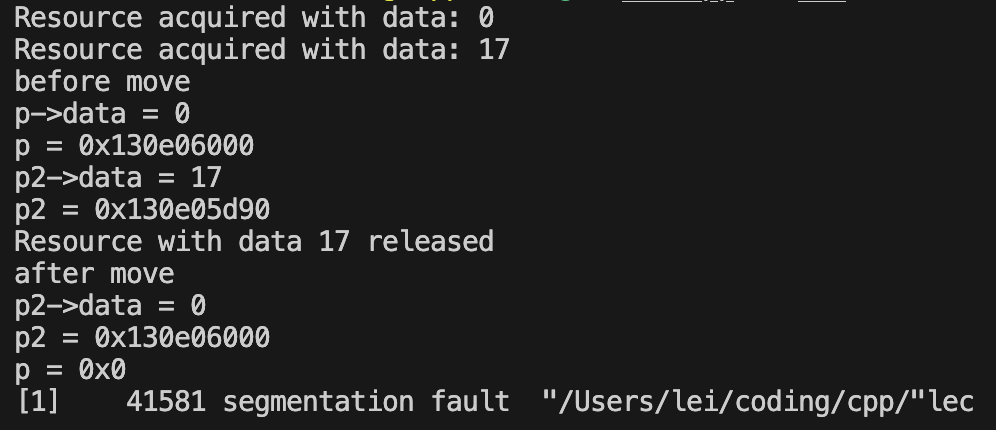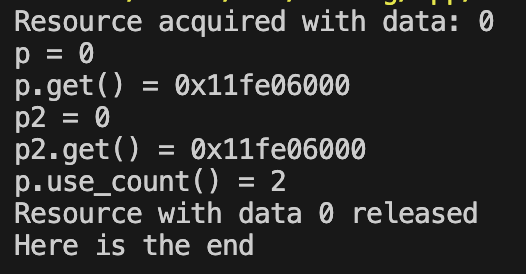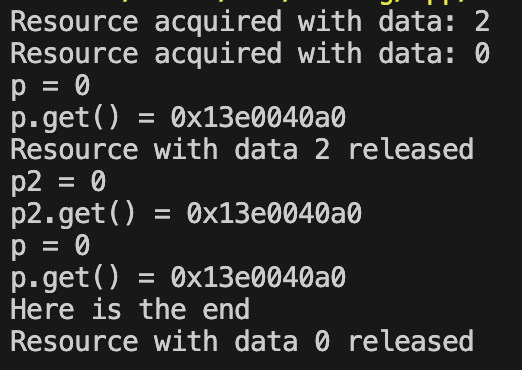智能指针¶
约 1206 个字 289 行代码 5 张图片 预计阅读时间 10 分钟
为什么我们需要智能指针
智能指针是对普通指针的封装,主要解决了C++中原始指针使用过程中的以下几个主要问题:
-
内存泄漏问题:在使用原始指针时,如果忘记调用
delete来释放内存,就会导致内存泄漏。智能指针通过RAII(资源获取即初始化)机制,在对象离开作用域时自动释放内存,避免了这个问题。 -
异常安全:当函数发生异常时,堆上分配的内存可能无法正确释放。智能指针能确保即使在异常发生时,内存也能被正确释放。
-
所有权管理复杂:在大型程序中,很难跟踪谁拥有某个指针,谁负责删除它。智能指针通过不同的模型(如独占所有权、共享所有权等)清晰地表达了资源的所有权意图。
-
悬挂指针问题:使用普通指针时,一个指针可能指向已经被释放的内存(悬挂指针),而智能指针可以避免这种情况。
-
代码简化:智能指针减少了手动内存管理的代码量,让开发者可以专注于业务逻辑而不是内存管理细节。
使用#include <memory>头文件来使用智能指针。
智能指针有:
-
std::unique_ptr:独占所有权的智能指针,不能被复制,只能被移动。适用于一个对象只有一个所有者的场景。 -
std::shared_ptr:共享所有权的智能指针,可以被多个指针共享。适用于多个对象需要共享同一个资源的场景。它使用引用计数来管理资源的生命周期,当最后一个指向该资源的shared_ptr被销毁时,资源才会被释放。 -
std::weak_ptr:弱引用智能指针,不能单独拥有资源,只能与shared_ptr一起使用。它用于解决循环引用的问题。weak_ptr不会增加引用计数,因此不会阻止资源的释放。
std::unique_ptr¶
#include<iostream>
#include<memory>
using namespace std;
struct Resource{
int data;
Resource(int d=0) : data(d) {
cout << "Resource acquired with data: " << data << endl;
}
~ Resource() {
cout << "Resource with data " << data << " released" << endl;
}
};
int main(){
unique_ptr<Resource> p(new Resource);
}
运行结果为:
这样,说明指针p在结束时自动释放了资源,尽管我们没有手动调用delete。这就是RAII的好处。
使用unique_ptr¶
-
unique_ptr可以像正常指针一样解引用: -
unique_ptr不能被复制:- 如果能赋值的话,那么
p和p2都管理同一块内存,这不仅违背了unique_ptr的设计初衷,而且会导致内存泄漏,因为当p和p2都被销毁时,它们会尝试释放同一块内存.
- 如果能赋值的话,那么
-
可以使用
std::move来转移所有权:int main(){ unique_ptr<Resource> p(new Resource); unique_ptr<Resource> p2(new Resource(17)); cout << "before move" << endl; cout << "p->data = "<<p->data << endl; cout << "p = "<<p.get() << endl; cout << "p2->data = "<<p2->data << endl; cout << "p2 = "<<p2.get() << endl; p2 = std::move(p); cout<<"after move" << endl; cout << "p2->data = "<<p2->data << endl; cout << "p2 = "<<p2.get() << endl; cout << "p = "<<p.get() << endl; try { cout << "p->data = "<<p->data << endl; } catch (const std::exception& e) { cout << "Exception: " << e.what() << endl; } }-
std::move将p的所有权转移给p2,此时p变为nullptr,而p2拥有资源的所有权. -
所以这里会报一个段错误,因为
p已经不再拥有资源的所有权,它指向的内存已经被释放了. -
并且,在
move都同时,p2原来的资源会调用析构函数
-
实现unique_ptr¶
-
定义基本的资源和函数
-
定义指针需要的解引用等操作函数
-
禁用复制构造函数和赋值运算符
-
定义移动构造函数和赋值运算符(
&&表示右值引用) -
完整代码
#include<iostream> #include<memory> using namespace std; struct Resource{ int data; Resource(int d=0) : data(d) { cout << "Resource acquired with data: " << data << endl; } ~ Resource() { cout << "Resource with data " << data << " released" << endl; } }; template<typename T> class u_ptr{ private: T* ptr; public: explicit u_ptr(T* p = nullptr) : ptr(p) {} ~u_ptr() { delete ptr; } T* operator*() { return ptr; } T* operator->() { return ptr; } T* get() const{ return ptr; } T* release() { T* temp = ptr; ptr = nullptr; return temp; } void reset(T* p = nullptr) { delete ptr; ptr = p; } u_ptr(const u_ptr&) = delete; u_ptr& operator=(const u_ptr&) = delete; u_ptr(u_ptr&& other) noexcept : ptr(other.release()) {} u_ptr& operator=(u_ptr&& other) noexcept { if (this != &other) { reset(other.release()); } return *this; } }; int main(){ u_ptr<Resource> p(new Resource); u_ptr<Resource> p2(new Resource(17)); cout << "before move" << endl; cout << "p->data = "<<p->data << endl; cout << "p = "<<p.get() << endl; cout << "p2->data = "<<p2->data << endl; cout << "p2 = "<<p2.get() << endl; p2 = std::move(p); cout<<"after move" << endl; cout << "p2->data = "<<p2->data << endl; cout << "p2 = "<<p2.get() << endl; cout << "p = "<<p.get() << endl; }
也可以为一个数组实现
unique_ptr,使用std::unique_ptr<T[]>来管理动态数组的内存,这样可以避免手动调用delete[]来释放内存.
#include <iostream>
#include <memory>
using namespace std;
int main() {
// 创建一个动态数组
unique_ptr<int[]> arr(new int[5]);
// 初始化数组
for (int i = 0; i < 5; ++i) {
arr[i] = i * 10;
}
// 输出数组元素
for (int i = 0; i < 5; ++i) {
cout << arr[i] << " ";
}
cout << endl;
// 不需要手动释放内存,arr会在离开作用域时自动释放
}
std::shared_ptr¶
int main(){
{
shared_ptr<Resource> p(new Resource);
cout << "p = " << p->data << endl;
cout << "p.get() = " << p.get() << endl;
shared_ptr<Resource> p2(p);
cout << "p2 = " << p2->data << endl;
cout << "p2.get() = " << p2.get() << endl;
cout << "p.use_count() = " << p.use_count() << endl;
}
cout<<"Here is the end"<<endl;
}
这里,p和p2都指向同一块内存,并且引用计数为2,当p和p2都被销毁时,资源才会被释放.
那么,对于共享指针,如果有两个指针管理同一片内存,并且有一个指针废弃的时候,发生了什么?
int main(){
shared_ptr<Resource> p2(new Resource(2));
{
shared_ptr<Resource> p(new Resource);
cout << "p = " << p->data << endl;
cout << "p.get() = " << p.get() << endl;
p2 = p;
cout << "p2 = " << p2->data << endl;
cout << "p2.get() = " << p2.get() << endl;
cout <<"p = " << p->data << endl;
cout << "p.get() = " << p.get() << endl;
}
cout <<"Here is the end"<<endl;
}
可以看到:
这里和上面有什么区别呢?
可以发现,资源析构的地方不同.第一段代码资源在cout<<"Here is the end"<<endl;前析构,而第二段代码则在cout<<"Here is the end"<<endl;后析构.
这是因为:
-
{}可以标定变量的作用域,当p离开作用域时,它会自动释放资源,并且引用计数会减1. -
第二段代码中,
p2的作用域在{}外,所以当p离开作用域时,p2仍然指向同一块内存,并且引用计数会减1,但是资源不会被释放. -
所以只有当函数结束,
p2的引用计数为0时,资源才会被释放.
所以,shared_ptr的析构发生在引用计数为0时,而不是在某个指针离开作用域时.
实现shared_ptr¶
-
定义基本的资源和函数
template<typename T> class s_ptr{ private: struct Control_block{ int ref_count; T* p; Control_block(T* p) : ref_count(1), p(p) {} ~Control_block() { delete p; } }; Control_block* cb; void add_shared(){ if(cb){ ++cb->ref_count; } } void release(){ if(cb){ --cb->ref_count; if(cb->ref_count == 0){ delete cb; } } } public: explicit s_ptr(T* p = nullptr) : cb(p ? new Control_block(p) : nullptr) {} ~s_ptr(){ release(); } }; -
实现拷贝复制等操作,因为这是允许的
-
实现解引用等
-
还有
swap函数,可以交换两个shared_ptr的资源




